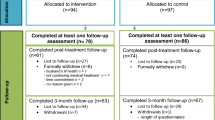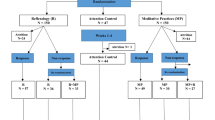Abstract
Purpose
To examine symptom responses resulting from a home-based reflexology intervention delivered by a friend/family caregivers to women with advanced breast cancer undergoing chemotherapy, targeted, and/or hormonal therapy.
Methods
Patient-caregiver dyads (N = 256) were randomized to 4 weekly reflexology sessions or attention control. Caregivers in the intervention group were trained by a reflexology practitioner in a 30-min protocol. During the 4 weeks, both groups completed telephone symptom assessments using the M. D. Anderson Symptom Inventory. Those who completed at least one weekly call were included in this secondary analysis (N = 209). Each symptom was categorized as mild, moderate, or severe using established interference-based cut-points. Symptom response meant an improvement by at least one category or remaining mild. Symptom responses were treated as multiple events within patients and analyzed using generalized estimating equations technique.
Results
Reflexology was more successful than attention control in producing responses for pain (OR = 1.84, 95% CI (1.05, 3.23), p = 0.03), with no significant differences for other symptoms. In the reflexology group, greater probability of response across all symptoms was associated with lower number of comorbid condition and lower depressive symptomatology at baseline. Compared to odds of responses on pain (chosen as a referent symptom), greater odds of symptom response were found for disturbed sleep and difficulty remembering with older aged participants.
Conclusions
Home-based caregiver-delivered reflexology was helpful in decreasing patient-reported pain. Age, comorbid conditions, and depression are potentially important tailoring factors for future research and can be used to identify patients who may benefit from reflexology.
Trial registration
ClinicalTrials.gov Identifier: NCT01582971
Similar content being viewed by others
References
AmericanCancerSociety (2018) Caregiver researce guide: caring for a loved one with cancer. https://www.cancer.org/content/dam/cancer-org/cancer-control/en/booklets-flyers/american-cancer-society caregiver-resource-guide.pdf. Accessed 26 Nov 2018
Barsevick AM, Cleeland CS, Manning DC, O’Mara AM, Reeve BB, Scott JA, Sloan JA, ASCPRO (Assessing Symptoms of Cancer Using Patient-Reported Outcomes) (2010) ASCPRO recommendations for the assessment of fatigue as an outcome in clinical trials. J Pain Symptom Manag 39(6):1086–1099. https://doi.org/10.1016/j.jpainsymman.2010.02.006
Cella D, Wagner L, Cashy J, Hensing TA, Yount S, Lilenbaum RC (2007) Should health-related quality of life be measured in cancer symptom management clinical trials? Lessons learned using the functional assessment of cancer therapy. J Natl Cancer Inst Monogr 37:53–60. https://doi.org/10.1093/jncimonographs/lgm009
Henoch I, Bergman B, Danielson E (2008) Dyspnea experience and management strategies in patients with lung cancer. Psycho-Oncology 17(7):709–715. https://doi.org/10.1002/pon.1304
Boon HS, Olatunde F, Zick SM (1998) Trends in complementary/alternative medicine use by breast cancer survivors: comparing survey data from 1998 and 2005. BMC Womens Health 7(4) https://doi.org/10.1186/14726874-7-4
Byers DC (1983) Better health with foot reflexology: the original Ingham method including hand reflexology. Publishing, Inc, St. Petersburg
Wyatt G, Sikorskii A, Tesnjak I, Frambes D, Holmstrom A, Luo Z, Victorson D, Tamkus D (2017) A randomized clinical trial of caregiver-delivered reflexology for symptom management during breast cancer treatment. J Pain Symptom Manag 54(4):670–679
Luo Z, Wang L, Sikorskii A, Wyatt G (2018) Healthcare service utilization and work-related productivity in reflexology intervention for advanced breast cancer women. Support Care Cancer:2018. https://doi.org/10.1007/s00520-018-4592-4
Wyatt G, Sikorskii A, Rahbar MH, Victorson D, You M (2012) Health-related quality-of-life outcomes: a reflexology trial with patients with advanced-stage breast cancer. Oncol Nurs Forum 39(6):568–577. https://doi.org/10.1188/12.ONF.568-577
Haywood A, Duc J, Good P, et al (2019) Systemic corticosteroids for the management of cancer-related breathlessness (dyspnoea) in adults. Cochrane Database Syst Rev 2019(2) https://doi.org/10.1002/14651858.CD012704.pub2
Lopez G, Christie AJ, Powers-James C, Bae MS, Dibaj SS, Gomez T, Williams JL, Bruera E (2019) The effects of inpatient music therapy on self-reported symptoms at an academic cancer center: a preliminary report. Support Care Cancer. https://doi.org/10.1007/s00520-019-04713-4
Miaskowski C (2016) Future directions in symptom cluster research. Semin Oncol Nurs 32(4):405–415. https://doi.org/10.1016/j.soncn.2016.08.006
Jeon S, Sikorskii A, Given BA et al (2018) Latent transition analysis of the symptom experience of cancer patients undergoing chemotherapy. Nurs Res. https://doi.org/10.1097/NNR.0000000000000332 [published Online First: ahead of print]
Kwekkeboom KL (2016) Cancer symptom cluster management. Semin Oncol Nurs 32(4):373–382
Xiao C, Bruner DW, Jennings BM, Hanlon AL (2014) Methods for examining cancer symptom clusters over time. Nurs Res 37(1):65–74. https://doi.org/10.1002/nur.21572
Cleeland CS, Reyes-Gibby C (2002) When is it justified to treat symptoms? Measuring symptom burden. Oncology (Williston Park) 16(9 Suppl 10):64–70
Sikorskii A, Given C, You M et al (2009) Response analysis for multiple symptoms revealed differences between arms of a symptom management trial. J Clin Epidemiol 62(7):716–724
Cleeland CS, Mendoza TR, Wang XS, Chou C, Harle MT, Morrissey M, Engstrom MC (2000) Assessing symptom distress in cancer patients: the M.D. Anderson Symptom Inventory. Cancer 89(7):1634–1646
Given B, Given C, Sikorskii A et al (2009) Establishing mild, moderate and severe scores for cancer related symptoms: how consistent and clinically meaningful are interference based severity cut points? J Pain Symptom Manag 35(2):126–135
Jeon S, Given C, Sikorskii A et al (2009) Do interference based cut-points differentiate mild, moderate and severe levels of 16 cancer related symptoms over time? J Pain Symptom Manag 37(2):220–232
Badger T, Segrin C, Dorros SM, Meek P, Lopez AM (2007) Depression and anxiety in women with breast cancer and their partners. Nurs Res 56(1):44–53
Bayliss EA, Ellis JL, Steiner JF (2009) Seniors’ self-reported multimorbidity captured biopsychosocial factors not incorporated into two other data-based morbidity measures. J Clin Epidemiol 62(5):550–557
Radloff LS, Locke BZ (1986) The community mental health assessment survey and the CES-D scale. Rutgers University Press, New Brunswick
Given C, Sikorskii A, Tamkus D et al (2008) Managing symptoms among breast cancer patients during chemotherapy: results of a two arm behavioral trial. J Clin Oncol 26(36):585–562
SAS (2013) SAS 9.4. NC: Cary
Unlu A, Kirca O, Ozdogan M (2018) Reflexology and cancer. J Oncological Sciences 4(2):96–101. https://doi.org/10.1016/j.jons.2018.01.001
Quattrin R, Zanini A, Buchini S et al (2006) Use of reflexology foot massage to reduce anxiety in hospitalized cancer patients in chemotherapy treatment: methodology and outcomes. J Nurs Manag 14(2):96–105
Stephenson N, Dalton JA, Carlson J (2003) The effect of foot reflexology on pain in patients with metastatic cancer. Appl Nurs Res 16(4):284–286. https://doi.org/10.1016/j.apnr.2003.08.003
Tsay S, Chen H, Chen S et al (2008) Effects of reflexology on acute postoperative pain and anxiety among patients with digestive cancer. Cancer Nurs 31(2):109–115
Sharp DM, Walker MB, Chaturvedi A, Upadhyay S, Hamid A, Walker AA, Bateman JS, Braid F, Ellwood K, Hebblewhite C, Hope T, Lines M, Walker LG (2010) A randomized, controlled trial of the psychological effects of reflexology in early breast cancer. Eur J Cancer 46(2):312–322
Stephenson N, Swanson M, Dalton J et al (2007) Partner-delivered reflexology: effects on cancer pain and anxiety. Oncol Nurs Forum 34(1):127–132
Stephenson NL, Weinrich SP, Tavakoli AS (2000) The effects of foot reflexology on anxiety and pain in patients with breast and lung cancer. Oncol Nurs Forum 27(1):67–72
Wyatt GK, Sikorskii A, Siddiqi A, Given CW (2007) Feasibility of reflexology and guided imagery intervention during chemotherapy: results of a quasi-experimental study. Oncol Nurs Forum 34(3):635–642
Wyatt GK, Sikorskii A, Rahbar MH, Victorson D, Adams L (2010) Intervention fidelity: aspects of complementary and alternative medicine (CAM) research. Cancer Nurs 33(5):331–342
Frambes D, Lehto R, Sikorskii A, Tesnjak I, Given B, Wyatt G (2017) Fidelity scorecard: evaluation of a caregiver-delivered symptom management intervention. J Adv Nurs 73(8):2012–2021. https://doi.org/10.1111/jan.13266
Badger T, Lazenby M (2015) Depression. In: Brown C (ed) A guide to oncology symptom management, 2nd end. Oncology Nursing Society, Pittsburgh, pp 239–264
Beckjord EB, Arora NK, McLaughlin W, Oakley-Girvan I, Hamilton AS, Hesse BW (2008) Health-related information needs in a large and diverse sample of adult cancer survivors: implications for cancer care. J Cancer Surviv 2(3):179–189
Buntrock C, Berking M, Smit F, Lehr D, Nobis S, Riper H, Cuijpers P, Ebert D (2017) Preventing depression in adults with subthreshold depression: health-economic evaluation alongside a pragmatic randomized controlled trial of a web-based intervention. J Med Internet Res 19(1):e5. https://doi.org/10.2196/jmir.6587
Acknowledgments
The research team would like to thank our dedicated participants who made this study possible.
Funding
Grant R01 CA157459 Home-Based Symptom Management via Reflexology for Advanced Breast Cancer Patients. Principal Investigator: G. Wyatt.
Author information
Authors and Affiliations
Corresponding author
Ethics declarations
The investigators’ university granted Institutional Review Board (IRB) approval, and IRB approvals were subsequently obtained from all recruitment sites.
Conflict of interest
The authors declare that they have no conflict of interest.
Additional information
Publisher’s note
Springer Nature remains neutral with regard to jurisdictional claims in published maps and institutional affiliations.
Rights and permissions
About this article
Cite this article
Sikorskii, A., Niyogi, P.G., Victorson, D. et al. Symptom response analysis of a randomized controlled trial of reflexology for symptom management among women with advanced breast cancer. Support Care Cancer 28, 1395–1404 (2020). https://doi.org/10.1007/s00520-019-04959-y
Received:
Accepted:
Published:
Issue Date:
DOI: https://doi.org/10.1007/s00520-019-04959-y




